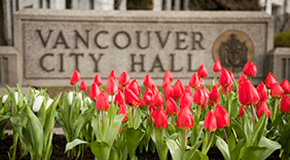VANCOUVER Mayor Gregor Robertson and City Council approved the legalization of duplexes in 99 per cent of all single family neighbourhoods in Vancouver, following two days of public hearings.
“The decision by Council to make it legal to build duplexes in single family neighbourhoods across Vancouver is one more step we’re taking to boost the right supply of housing for people who live and work in Vancouver,” said Robertson. “This is not a silver bullet for Vancouver’s housing challenges, but we have to deal with the fact that more than half of the City’s land base is zoned exclusively for single family homes – homes that are out of reach for the overwhelming majority of residents. Over the past two years of consultation for the new Housing Vancouver strategy, we heard loud and clear that Vancouverites want more housing options in single family neighbourhoods. Allowing duplexes – which are already permitted in neighbourhoods like Kitsilano, Strathcona and Grandview Woodland – is a modest but important change to provide more housing options.”
The policy change is part of the City’s Making Room program, which provides more “missing middle” housing options in neighbourhoods across the city at a time when many single family neighbourhoods are seeing a decrease in population, particularly families with children. In the most recent census, single family neighbourhoods such as Dunbar, Kerrisdale and Arbutus Ridge saw a decrease in population.
Approximately 67,000 single family (RS) lots, which comprise 52 per cent of the City’s land mass, are now eligible for duplexes. The change will increase the maximum number of dwelling units allowed on an RS lot to four – a duplex, each with a lock-off or secondary suite. The current RS maximum is three: a single family house, secondary suite and a laneway house.
The change to RS zoning is now aligned with that of RT zoning, which allows duplexes. It means that neighbourhoods like Dunbar, Kerrisdale and West Point Grey are now allowed the same housing option— duplexes—on a single lot as is permitted in RT neighbourhoods like Kitsilano, Strathcona, or Grandview Woodland. The changes approved today by Council will provide an ownership option within these neighbourhoods that is more affordable than a detached home.
The policy change does not allow for an increase in height or density, as a way to reduce speculation on land values. Further work is underway as part of the Making Room program to bring forward options for rowhouses, townhouses, and low-rise apartments— with a priority on rental housing and co-ops— in low-density neighbourhoods. This report is expected to come to the next City Council by summer 2019.
The Making Room program directly supports the Housing Vancouver strategy, which targets the delivery of 10,000 units of housing geared towards middle income households over the next 10 years, specifically 1,000 coach houses, 5,000 townhouses and 4,000 laneway houses.
In November 2017, Council adopted the Housing Vancouver strategy which was a result of engagement with more than 10,000 residents over a period of 18 months. This engagement clearly identified a desire for more “missing middle” housing options, such as duplexes, in neighbourhoods across the city.
Extensive public feedback was gathered through two Talk Vancouver surveys completed by more than 10,000 Vancouver and Metro Vancouver residents, eight open houses and additional targeted consultation meetings, two major public events attended by hundreds of Vancouverites, and feedback provided by three City Advisory committees: The Renters’ Advisory Committee, Seniors’ Advisory Committee, and the Children, Youth and Families Advisory Committee.
There have also been four public reports to City Council on the Housing Vancouver strategy since March 2017, detailing the City’s efforts to increase housing options throughout Vancouver.
In public opinion research conducted for the City by Research Co in April 2018, 65 per cent of Vancouver residents strongly or somewhat supported the statement, “The 10-year housing strategy definitely takes the right approach—we need to add new housing options into single family neighbourhoods to deal with our housing challenges.”
To find out more about the City of Vancouver’s work to increase housing choices, visit http://vancouver.ca/people-programs/housing-vancouver-strategy.aspx.











